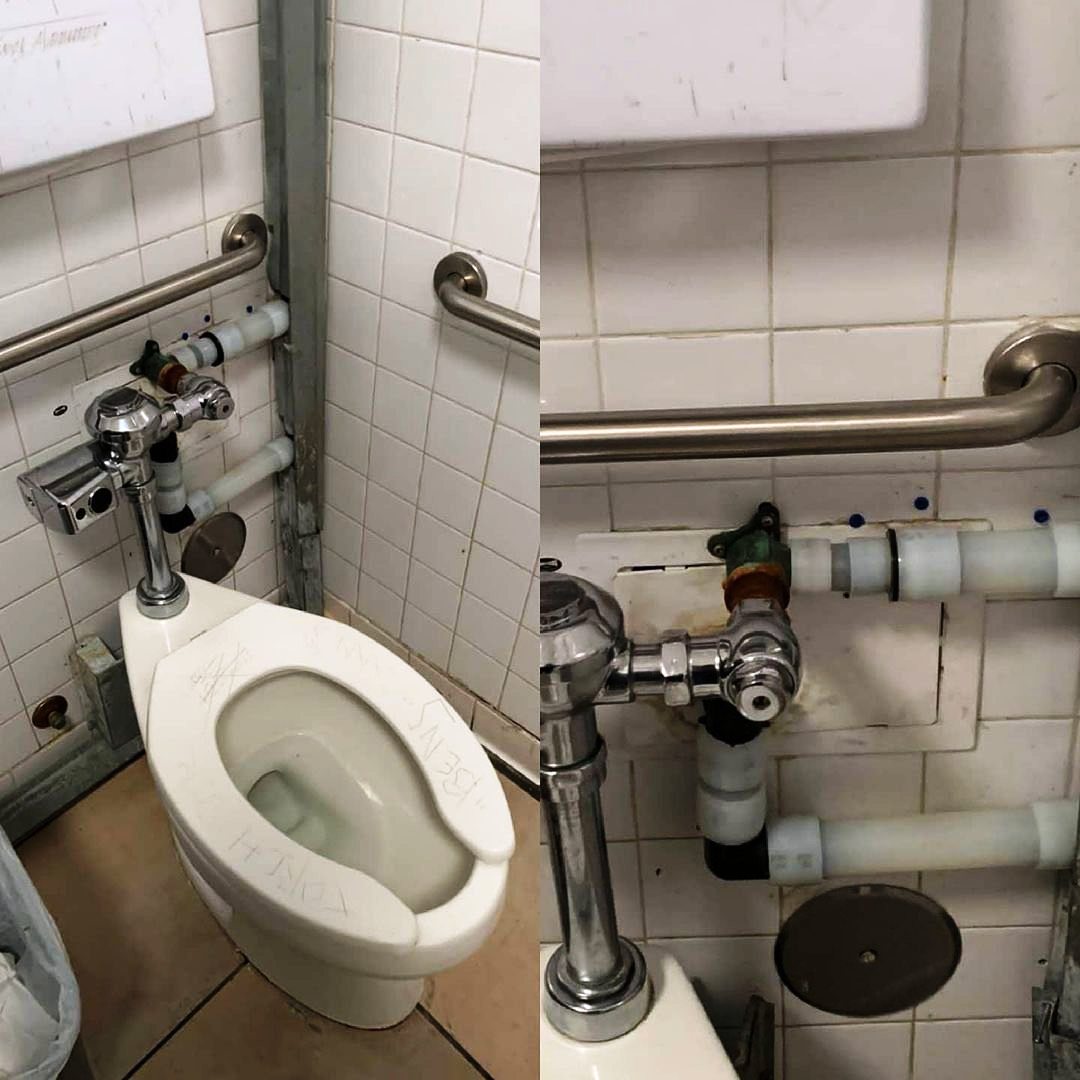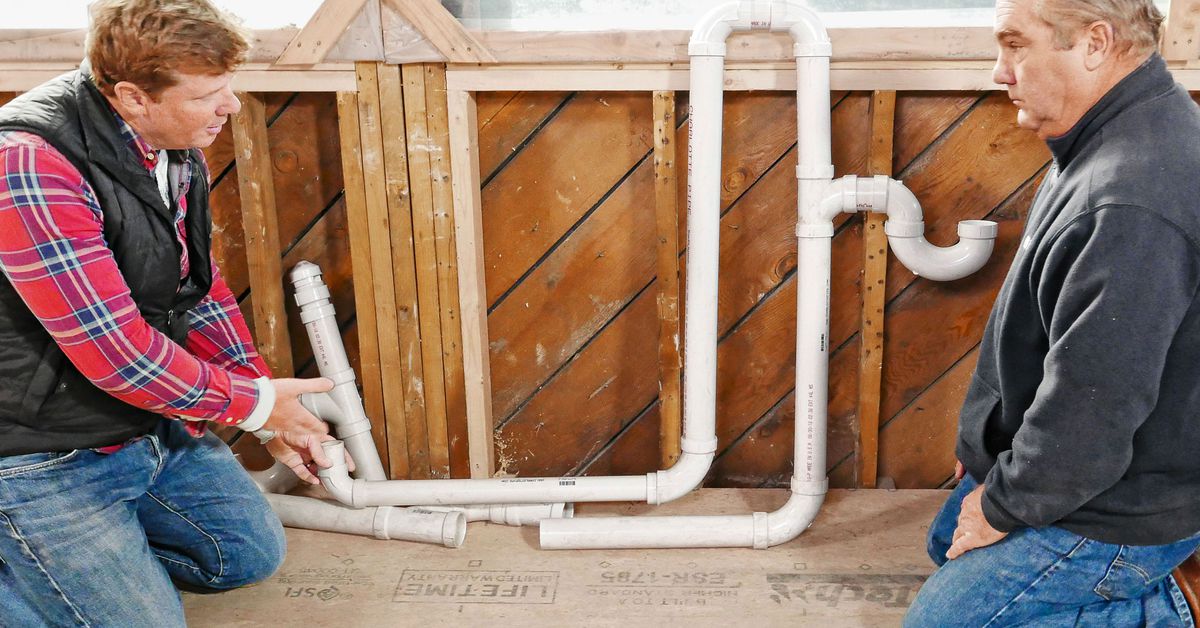Repairing Plumbing Sounds: A Step-By-Step Handbook
Repairing Plumbing Sounds: A Step-By-Step Handbook
Blog Article
We have noticed this article relating to Why Do My Pipes Make Noises below on the web and figured it made sense to discuss it with you on this site.

To diagnose noisy plumbing, it is very important to establish first whether the unwanted sounds occur on the system's inlet side-in other words, when water is turned on-or on the drain side. Noises on the inlet side have varied reasons: excessive water pressure, worn valve and faucet parts, poorly attached pumps or other devices, improperly put pipe bolts, as well as plumbing runs including way too many limited bends or other limitations. Sounds on the drainpipe side typically stem from inadequate place or, as with some inlet side sound, a layout containing limited bends.
Hissing
Hissing noise that takes place when a tap is opened slightly generally signals extreme water pressure. Consult your regional water company if you suspect this issue; it will certainly be able to inform you the water stress in your location and can set up a pressurereducing shutoff on the incoming water system pipe if required.
Various Other Inlet Side Noises
Creaking, squeaking, scraping, breaking, and tapping normally are brought on by the growth or tightening of pipes, typically copper ones supplying warm water. The audios happen as the pipes slide against loose fasteners or strike close-by residence framework. You can often pinpoint the place of the issue if the pipes are exposed; just adhere to the audio when the pipelines are making noise. Most likely you will uncover a loosened pipe wall mount or a location where pipes exist so near floor joists or various other mounting pieces that they clatter versus them. Attaching foam pipeline insulation around the pipes at the point of contact ought to remedy the issue. Make certain bands as well as wall mounts are safe and secure and supply adequate support. Where feasible, pipeline fasteners ought to be connected to massive architectural components such as structure walls rather than to mounting; doing so decreases the transmission of vibrations from plumbing to surfaces that can magnify as well as transfer them. If connecting fasteners to framing is inevitable, wrap pipes with insulation or other resilient material where they speak to fasteners, and sandwich completions of new bolts between rubber washing machines when mounting them.
Dealing with plumbing runs that deal with flow-restricting limited or various bends is a last option that should be carried out only after seeking advice from a proficient plumbing specialist. Regrettably, this scenario is relatively typical in older homes that might not have actually been developed with indoor plumbing or that have actually seen several remodels, specifically by novices.
Babbling or Shrieking
Intense chattering or shrilling that occurs when a shutoff or tap is switched on, which typically goes away when the fitting is opened totally, signals loose or faulty inner parts. The service is to change the shutoff or faucet with a brand-new one.
Pumps and appliances such as cleaning equipments and also dishwashing machines can move electric motor noise to pipes if they are improperly linked. Link such products to plumbing with plastic or rubber hoses-never inflexible pipe-to isolate them.
Drain Sound
On the drainpipe side of plumbing, the principal objectives are to get rid of surface areas that can be struck by falling or rushing water as well as to insulate pipes to contain unavoidable sounds.
In brand-new building and construction, bath tubs, shower stalls, toilets, and also wallmounted sinks as well as basins need to be set on or versus resistant underlayments to minimize the transmission of sound through them. Water-saving bathrooms as well as taps are much less noisy than conventional models; mount them rather than older kinds even if codes in your location still permit making use of older fixtures.
Drains that do not run vertically to the basement or that branch into straight pipe runs sustained at floor joists or various other framing existing particularly troublesome noise troubles. Such pipes are big enough to radiate significant resonance; they likewise bring significant amounts of water, that makes the scenario worse. In brand-new building and construction, specify cast-iron soil pipes (the big pipelines that drain pipes commodes) if you can afford them. Their massiveness includes much of the noise made by water travelling through them. Additionally, avoid routing drainpipes in walls shared with bed rooms as well as spaces where people collect. Wall surfaces having drains should be soundproofed as was explained earlier, making use of dual panels of sound-insulating fiberboard as well as wallboard. Pipelines themselves can be covered with unique fiberglass insulation produced the function; such pipes have an impervious plastic skin (sometimes having lead). Results are not constantly sufficient.
Thudding
Thudding sound, usually accompanied by trembling pipes, when a tap or appliance valve is turned off is a problem called water hammer. The noise as well as vibration are brought on by the reverberating wave of stress in the water, which unexpectedly has no place to go. Sometimes opening a shutoff that discharges water rapidly right into a section of piping including a constraint, elbow, or tee fitting can generate the same condition.
Water hammer can generally be healed by setting up installations called air chambers or shock absorbers in the plumbing to which the issue shutoffs or faucets are linked. These tools allow the shock wave produced by the halted circulation of water to dissipate airborne they contain, which (unlike water) is compressible.
Older plumbing systems may have short upright areas of capped pipeline behind wall surfaces on tap competes the same purpose; these can eventually fill with water, decreasing or destroying their performance. The treatment is to drain pipes the water supply entirely by turning off the primary water system valve as well as opening all taps. Then open up the main supply valve as well as shut the taps individually, starting with the tap nearest the valve and also ending with the one farthest away.
Pipe Down! What to Do About Noisy Water Pipes
Banging
Does it sound like someone's hitting your pipes with a hammer every time you run water? The issue could be a phenomenon called water hammer, which happens when a water valve closes suddenly. You'll often hear it when your washing machine stops filling, for example. The momentum and pressure from the water flowing toward the valve create the shockwave that causes the banging noise when the valve closes suddenly. It might not seem like a big deal, but water hammer can cause damage to your pipes, including leaks and joint damage.
One way to ease water hammer is by installing water hammer arrestors. Your plumber can install them near major valves to help cushion the shock of the water when it suddenly stops or changes direction. You might also need to reduce the water pressure coming into your home with the pressure-reducing valve.
Gurgling
Gurgling sounds typically come from drainpipes. This sound happens when the water can't drain properly, usually when there's a clog in the water pipes. Drain clogs often happen due to hair, grease, soap scum or objects that fall down the drain. They can happen suddenly or build up slowly over time.
You can sometimes clear a clogged drainpipe with a plunger to help force the clog through the pipe. A plumbing snake or an auger can also help break up tough clogs. A common plumbing myth is that chemical drain cleaners are safe and effective, but they often don't work and contain harsh chemicals that can hurt you and your plumbing. If you can't remove the clog with a plunger or snake, it's best to call a plumber to help.
Rattling
Water travels through your pipes with lots of pressure, so the pipes are bound to move a little. Pipes should be secured well to keep them from moving too much when water runs through them. If they're not properly fastened or the fasteners come loose, you might hear them rattling when you run water.
Resecuring the pipes can cut down on the rattling noise and prevent damage to the joints of the water pipes. However, many pipes run behind walls where you can't easily access them. A plumber can help determine if loose fasteners are the cause of the rattling and resecure them if necessary.
Humming
If your pipes sound like they're humming, it's likely a water pressure issue. When the water pressure is high, it can cause the water pipes to vibrate and create a humming sound. High water pressure is more common if you have a well for your water, but it can happen with municipal water as well. High water pressure can damage your plumbing and cause leaks.
If you have a well, check the pressure to ensure it's below 55 pounds per square inch. A plumber can test the pressure for you and help adjust the issue if you're not sure how to do it yourself. If you're connected to the municipal water source, your home likely has a pressure-reducing valve near where the water enters your home. You can adjust the screw in the valve to decrease the pressure, but be careful not to lower it too much.
Squeaking
Squeaking or squealing is another common sound you'll hear in your water pipes. This often happens if small components within the plumbing, such as washers or aerators, become loose, dirty or damaged. When this is the cause, the squeaking sound is usually confined to a certain fixture or area of plumbing. Replaced or repairing the part should solve the noise.
If you can hear the squealing sound everywhere in your home, it could be an issue with water pressure. Buildup in the pipes narrows the space for the water, which can cause squealing as the water tries to squeeze through the pipes. Wear and tear on the plumbing system can also cause whistling or squeaking. These situations typically require a professional plumber to diagnose and repair.
https://www.homeserve.com/en-us/blog/home-improvement/water-pipes-making-noise/

I recently found that content about Why Do My Pipes Make Noises while doing a lookup on the search engines. Do you know about anybody else who is curious about the subject? Be sure share it. Thanks a lot for your time spent reading it.
Search no more; expert plumbers. Report this page